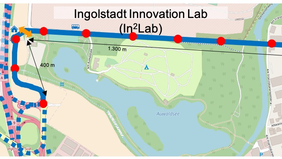The research project "IN2Lab" was kicked off at the Ingolstadt University of Technology (THI). The project is a key project when it comes to Ingolstadt's digital test field for automated and networked driving, the so-called "first mile". It connects the Ingolstadt-Süd motorway junction with the future IN-Campus technology park. The vision here is: driverless cars drive from the motorway over urban roads to the car park - and safely.
The three-year research project aims to develop a safety system for automated driving. For this purpose, the road infrastructure will be equipped with sensors, communication modules and IT and a control centre will be set up. This system will then supply data that will enhance the vehicles' perception of their surroundings. As an independent source, the sensors confirm the vehicle's own data and thus safeguard the automated driving functions. This test variant complements the existing methods - from simulations and laboratory tests to controlled driving tests - by testing in real traffic, the final stage of development.
With the test field, THI is expanding the existing indoor and outdoor test facilities of CARISSMA, the Research and Test Centre for Vehicle Safety. The infrastructure provides the technical basis for an innovation laboratory which will also be open to other research institutions, start-ups and companies in the future. In this way, the Technical University strengthens the AI mobility node Ingolstadt. IN2Lab is funded with €1.94 million in the Bavarian Collaborative Research Programme (BayVFP) funding line Digitisation.
The partners include Audi, the Car.Software organisation and Continental as well as Blickfeld and Savari, the specialists for Lidar and Car2X communication. The newly founded Fraunhofer Application Centre for Networked Mobility and Infrastructure (VMI) is also involved. Other associated partners support the project, including the city of Ingolstadt, the telecommunications company COM-IN, the chip manufacturer Qualcomm, S.E.A Datentechnik and Bayern Innovativ. The project is led by THI research professors Andreas Festag and Ondrej Vaculin and Gordon Elger.


![[Translate to English:] Logo Akkreditierungsrat: Systemakkreditiert](/fileadmin/_processed_/2/8/csm_AR-Siegel_Systemakkreditierung_bc4ea3377d.webp)








![[Translate to English:] Logo IHK Ausbildungsbetrieb 2023](/fileadmin/_processed_/6/0/csm_IHK_Ausbildungsbetrieb_digital_2023_6850f47537.webp)


